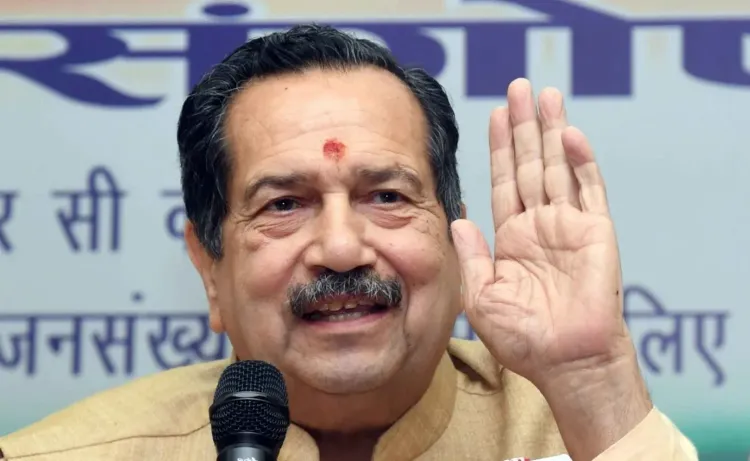Why Is RSS Leader Indresh Kumar Supporting a Muslim Woman’s Battle Against Waqf Land ‘Mafia’?

Synopsis
Key Takeaways
- Shamim Bano's case highlights systemic exploitation.
- Support from Indresh Kumar illuminates broader issues.
- Demands for justice emphasize need for legal reforms.
- Waqf Board’s actions raise serious concerns.
- This struggle is a rallying cry for the oppressed.
New Delhi, July 10 (NationPress) The fight of Shamim Bano, a Muslim woman from Ujjain, to regain her ancestral land is a glaring example of institutional neglect and religious oppression, igniting national outrage.
Her struggle, supported by the Muslim Rashtriya Manch and its influential leader, Indresh Kumar, sheds light on a larger crisis within religious organizations.
Indresh Kumar stated, “The Waqf system was designed to assist the underprivileged and voiceless; it should not be exploited for land acquisition. The notion that any Maulana or official is above the law must be eradicated.”
Bano, who is the rightful heir to a 4,000 square foot property registered under her grandfather Mohammad Hafiz in 1935, is currently facing a forceful and fraudulent takeover.
Despite possessing strong documentation, including registered deeds, mutation records, and tax receipts, she is being pressured to relinquish 1,800 square feet of her land, which is now unjustly claimed under a fictitious religious establishment referred to as Masjid Khair.
The assertions regarding Bano’s property are based not on religious belief but on deceit. A forged donation deed, reportedly bearing fraudulent signatures, has been used to justify the encroachment. No mosque has ever existed on the disputed land. There were no prayers, no Waqf records, just intimidation cloaked in religious rhetoric.
Bano has faced intimidation from Maulanas and local power brokers, who weaponize religious sentiments with statements like “speaking against a mosque is haram” to stifle her resistance.
What started as a legal property conflict has transformed into a national issue.
Bano’s appeal received significant support from Shalini Ali, National Convener of the Muslim Rashtriya Manch, who brought the situation to the attention of Indresh Kumar, the guiding force of the Manch.
Indresh Kumar underscored that this battle transcends the plight of one woman; it represents a stand against systemic exploitation disguised as religion. He pledged comprehensive legal, administrative, and social support, asserting that no woman should have to fight alone again.
The actions of the Waqf Board are coming under intense scrutiny. Despite numerous complaints and growing public anger, it remains disturbingly silent, leading to accusations of complicity and corruption. Many are now questioning whether it has devolved into a Waqf Mafia Board.
Shalini Ali’s unwavering support has turned Bano’s case into a beacon of resistance.
“No woman should be deprived of her constitutional rights under the guise of religion. The Manch stands with every woman fighting for her rightful place,” she proclaimed.
Adding urgency to her cause, Shamim Bano has outlined several demands to the government.
First, she calls for a judicial and forensic investigation into the forged donation deed and the prompt arrest of the individuals responsible.
Second, she seeks protection for herself and her family, citing legitimate threats to her safety.
Third, she demands immediate administrative action against the illegal encroachment and construction.
Finally, she calls for an independent investigation into the role of the Waqf Board and punishment for any officials found culpable.
This is not merely about one woman’s land; it signifies the awakening of an oppressed Muslim community that, despite possessing documentation, is coerced into silence in the name of religion.
Bano’s struggle serves as a warning—if action is not taken now, this fire will spread to every street tomorrow.









